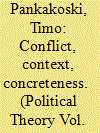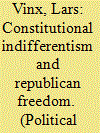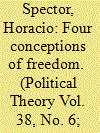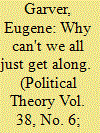| Srl | Item |
| 1 |
ID:
099885


|
|
|
|
|
| Publication |
2010.
|
| Summary/Abstract |
In Reinhart Koselleck's history of concepts, the general orientation that concepts are to be understood in their proper contexts is intertwined with the assumption that they are manifestations of particular political conflicts. The essay shows that the dense compound of context and conflict in Koselleck's thought springs from Carl Schmitt's political theory and also forms an important point of continuity between Koselleck's early work and his later methodological writings. The formalized assumption of conflict, somewhat problematically, binds Koselleckian conceptual history to a particular conception of politics, one that sees politics ultimately as struggle and conflict. Once the historical-theoretical contingency of this conception is recognized, it becomes both possible and necessary to reassess the role of conflict in the methodology of conceptual history.
|
|
|
|
|
|
|
|
|
|
|
|
|
|
|
|
| 2 |
ID:
099887


|
|
|
|
|
| Publication |
2010.
|
| Summary/Abstract |
Neo-republicans claim that Hobbes's constitutional indifferentism (the view that we have no profound reason to prefer one constitutional form over another) is driven exclusively by a reductive understanding of liberty as non-interference. This essay argues that constitutional indifferentism is grounded in an analysis of the institutional presuppositions of well-functioning government that does not depend on a conception of liberty as mere non-interference. Hence, indifferentism cannot be refuted simply by pointing out that non-domination is a distinctive ideal of freedom. This result does not suffice to defend the strong version of indifferentism put forward by Hobbes. But it does point to an important limitation of neo-republican constitutional theory: Neo-republicanism will amount to a distinctive paradigm of constitutional thought only if it is understood in a way that conflicts with Hobbes's understanding of the institutional presuppositions of well-functioning government. It is doubtful that we have good reason to embrace neo-republicanism, so understood.
|
|
|
|
|
|
|
|
|
|
|
|
|
|
|
|
| 3 |
ID:
099886


|
|
|
|
|
| Publication |
2010.
|
| Summary/Abstract |
Contemporary political philosophers discuss the idea of freedom in terms of two distinctions: Berlin's famous distinction between negative and positive liberty, and Skinner and Pettit's divide between liberal and republican liberty. In this essay I proceed to recast the debate by showing that there are two strands in liberalism, Hobbesian and Lockean, and that the latter inherited its conception of civil liberty from republican thought. I also argue that the contemporary debate on freedom lacks a perspicuous account of the various conceptions of freedom, mainly because it leaves aside the classic contrast between natural liberty and civil liberty. Once we consider both the negative/positive distinction and the natural/civil one, we can classify all conceptions of freedom within four basic irreducible categories. In light of the resulting framework I show that there are two distinct conceptions of republican liberty, natural and civil, and that the former is coupled with an ideal of individual self-control.
|
|
|
|
|
|
|
|
|
|
|
|
|
|
|
|
| 4 |
ID:
099888


|
|
|
|
|
| Publication |
2010.
|
| Summary/Abstract |
Spinoza presents a picture of the good human life in which being rational and being reasonable or sociable are mutually supporting: the philosopher makes the best citizen, and citizenship is the best route to philosophy and adequate ideas. Crucial to this mutual implication are the roles of religion and politics in promoting obedience. It is through obedience that people can become "of one mind and one body" in the absence of adequate ideas, through the presence of shared empowering imaginations and emotions.
|
|
|
|
|
|
|
|
|
|
|
|
|
|
|
|